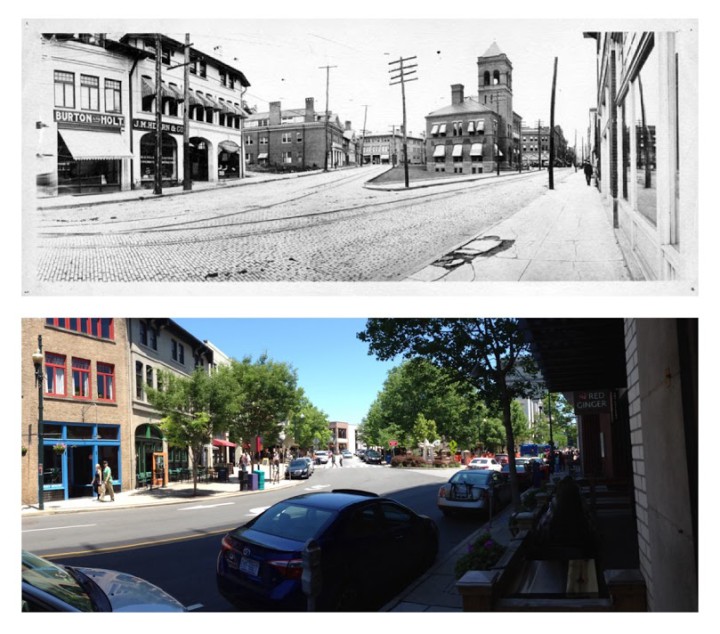On March 12, 1931, Asheville’s city park commission resolved to name the site of a future small, triangular park in honor of Jeter C. Pritchard. According to The Asheville Citizen, which included the resolution in print the following day, the commission declared:
“[T]he Honorable Jeter C. Pritchard served faithfully and well the State of North Carolina as United States senator, and later served with distinction as senior member of the United States circuit of appeals … and at all times led in civic movements for the uplifting and betterment of the city of Asheville, and was intimately identified with and interested deeply in the progress and welfare of this community, and was recognized as one of its outstanding leaders and citizens, and for many years and at the time of his death was a citizen of Asheville[.]”
When the resolution was made, however, the location of this future park still housed Asheville’s former post office. Built in 1892, the three-story brick building served the city’s residents for 38 years. It closed in 1930. On Feb. 11, 1932, after sitting vacant for two years, local contractor P.W. Bordner began work to raze the structure. Along with replacing it with a park, the city planned to widen the surrounding streets.
On Feb. 21, 1932, the Sunday edition of the Asheville Citizen-Times ran an article titled, “RAZING OF OLD BUILDING HERE RECALLS PAST.” In it, the newspaper offered a complete list of the city’s former postmasters, along with significant years and dates associated with local and national mail service. Some notable happenings included:
- On Jan. 1, 1801, Asheville’s first post office was established; its first postmaster was Jeremiah Cleveland.
- In 1838, all railways in the United States were declared to be post routes.
- In 1840, envelopes were invented. Prior to this, the article noted, “letters were generally written on single sheets of paper and then folded.”
- On July 1, 1847, the first postage stamp was placed on sale in New York City.

A month after the building was razed, the city’s longest-serving employee, William M. Jarrett retired from his letter carrier position. Jarrett’s career began in 1893, a year after the building was completed.
On March 6, 1932, the Sunday edition of the Asheville Citizen-Times reported on the ways in which the industry had changed during Jarrett’s 39-year tenure:
“Methods of carrying mail and operation of city routes have undergone radical changes since Mr. Jarrett entered the service. Sacks were not used by carriers then. Letters were held together by a large rubber strap, the postman carrying them under an arm. … Only a few of the streets had sidewalks, and the sidewalks were wooden planks.
“The average mail route prior to 1900 was approximately 15 miles long and only one delivery was made each day. Now the routes are much shorter, but the carrier must handle more mail and make two rounds daily. There were only six postmen in the city proper when Mr. Jarrett launched his career. Now, there are 34.”
On Dec. 17, 1932, The Asheville Citizen reported:
“Pritchard park, bare since the old post office building which formerly stood on its site was torn down, is rapidly being made one of the beauty spots of the city.
“For several days city workers, under the direction of C.D. Deals, superintendent of the Vanderbilt estate at Biltmore, have been busy setting out trees, shrubbery and hedges.”
Editor’s note: Peculiarities of spelling and punctuation are preserved from the original documents.



Asheville Archives: Pritchard Park replaces the old post office
Were there people back then claiming that we would all die shivering in the dark if the City didn’t put a hotel there instead?
The post office moved to the new Federal Building on Otis Street, which opened in 1929.
http://decoarchitecture.tumblr.com/post/160836400599/us-courthouse-veach-baley-federal-complex
It’s a pity that Asheville’s downtown post office is no longer in a historic civic building.